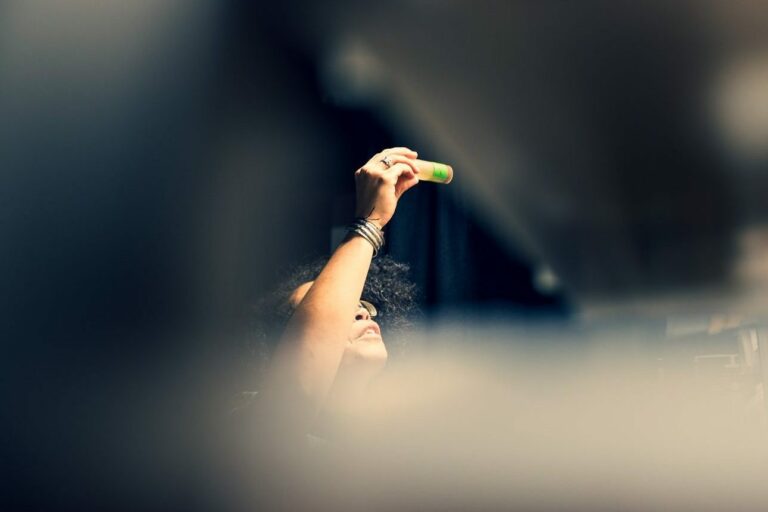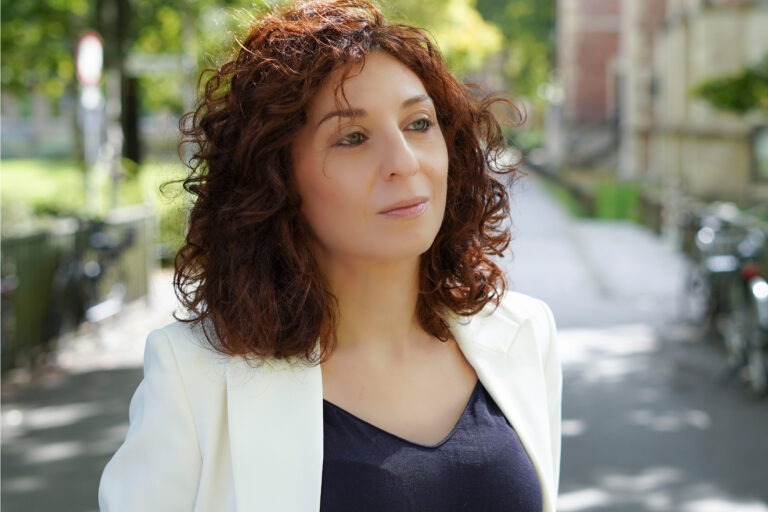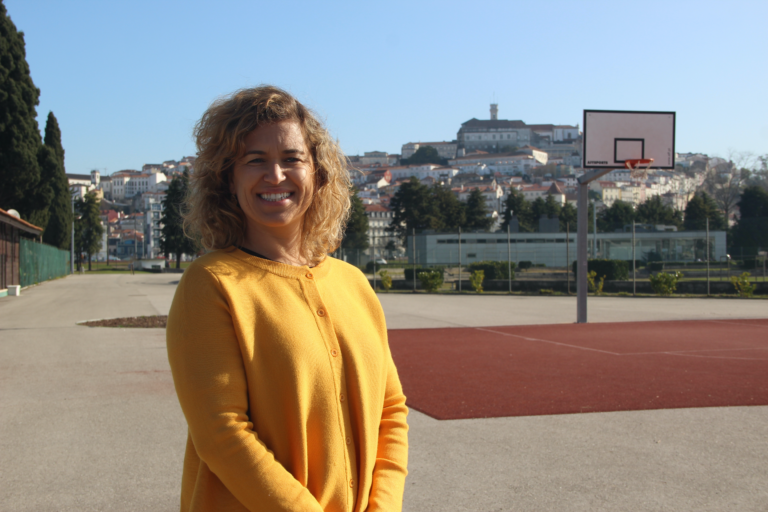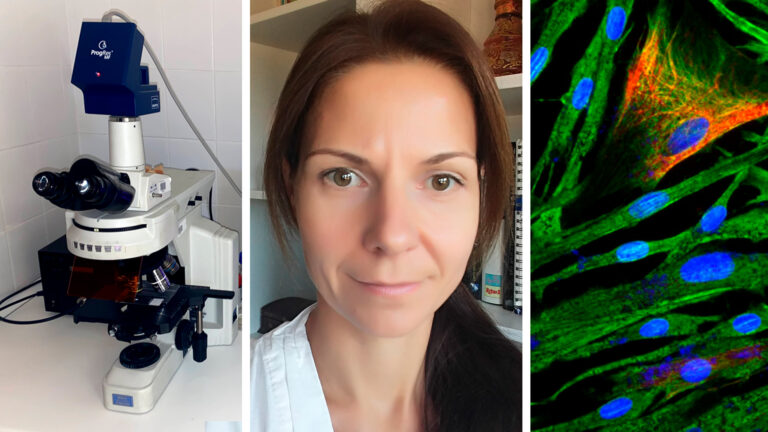
Making Discoveries Deep Within the Earth’s Mantle – in the Middle of Lectures and Student Supervision? All in a Day’s Work! An Interview with Geochemist Dr. Fernanda Gervasoni
In the series “33 questions” we introduce, in no particular order, our WiRe Fellows who are currently working on a research project here at the University of Münster. Why 33? Well, if we think of the rush hour of life, it is kind of the age that lies in the middle. And we also like the number😉.
In today’s episode we are speaking with Dr. Fernanda Gervasoni, Geologist and a passionate lover of the Earth`s mantle,
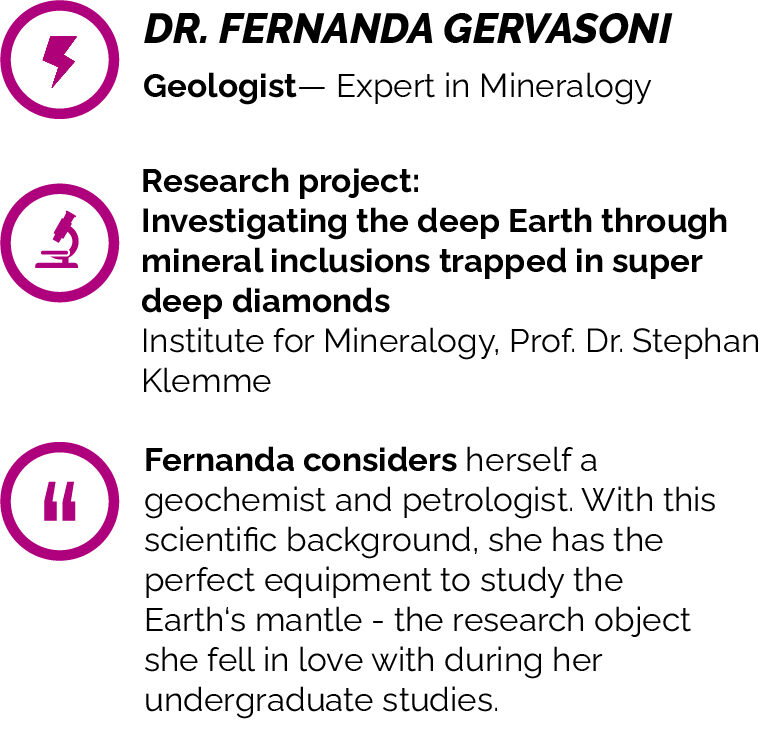
1. What motivated you to work in the field of Earth’s mantle mineralogy?
During my undergraduate studies, I started to investigate the Earth‘s mantle by studying natural samples called peridotites that lay 70 to 120km deep in the mantle’s lithosphere and come to the surface with volcanism.
Since then, I started to love this part of the planet and decided to dedicate my studies to investigated it.
Studying the Earth’s mantle is a huge mystery and a big challenge. First because natural samples from deep Earth are extremely rare, and second because we don’t see the geological process that occur inside the Earth. Now with the possibility to study natural minerals trapped inside diamonds that formed in the deepest part of the Earth’s mantle, it’s an incredible opportunity to understand the chemical conditions of a region so inaccessible.
2. Describe your daily work in three words.
Lab, reading, writing.
3. Describe your research topic in three words.
Diamonds, mantle, redox.
4. A good geochemist needs…?
An excellent lab at their institution to work easily to get the chemical data of the rock and mineral samples. Many geochemists don’t have a lab in their institution and have to travel far to obtain their data, which make it very difficult to do their research.
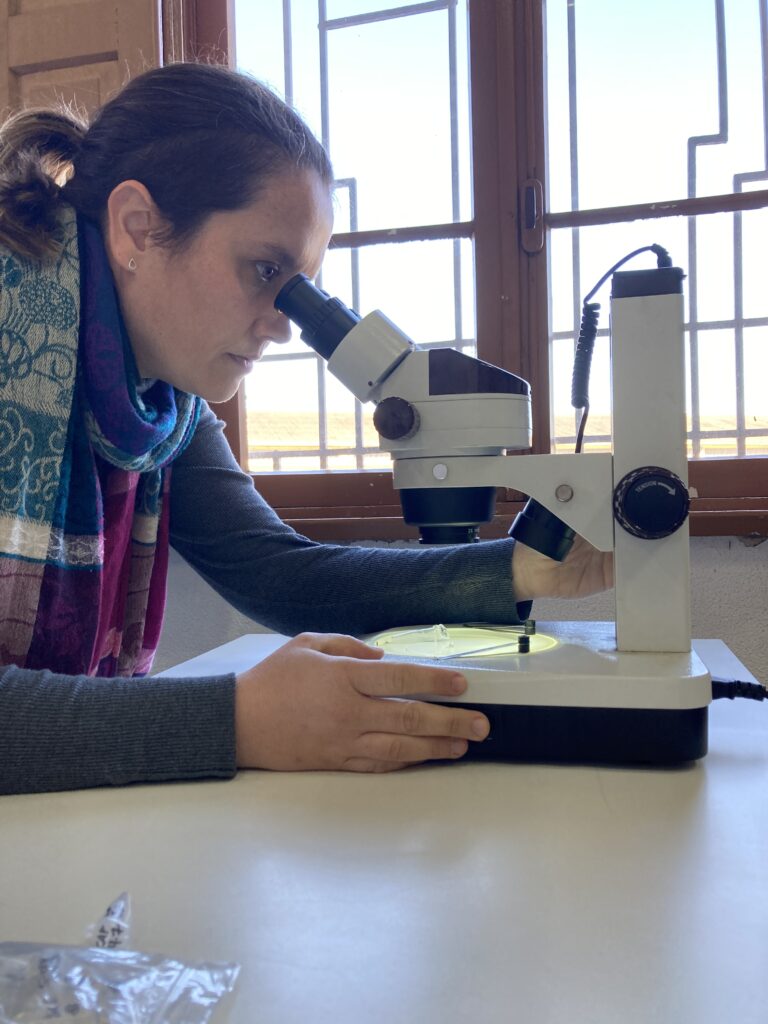
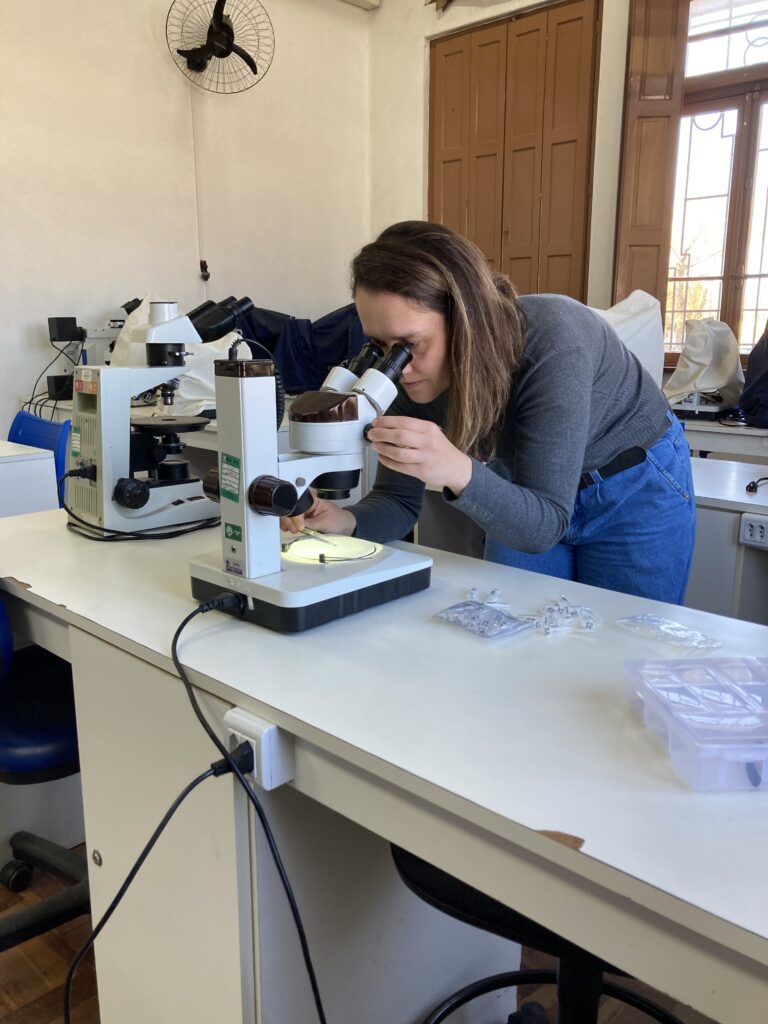
5. What does a typical (work) day look like for you?
Going to microscope first, then analyzing my samples and treating the data. Reading and writing is commonly present in my work day.
6. What was your biggest research disaster? What did you learn out of it?
I almost destroyed a furnace in the beginning of my PhD. I learned that I should check always more than once the process of any experiment I would do.
7. What keeps you motivated in your work day in and day out?
I think what motivated me most in my work day is to see that my studies make a difference in the geoscience field. This means that people understand the importance of my topic of study. Also, to see my bachelor and master students reaching their goals and advancing in science is great!
8. Which (historical) important scientist / researcher would you like to have dinner with? What would you ask?
I would love to have dinner with Katia Kraft! She was a geochemist and a pioneer volcanologist who studied volcanoes in the act! She and her husband made a big difference in this topic of volcanology with their investigations on the different kinds of volcanoes and their eruptions. They presented to the world how dangerous some eruptions can be and the need of evacuation of certain villages that are located around volcanoes.
My question to Katia would be simple: which volcano on the planet she loves the most? But I believe she didn’t have only one.
9. What was the funniest moment you had in science?
I did a field trip to Patagonia with a geologist from Japan and another friend from Brazil. We used a helicopter to land over a glacier and collect volcanic rocks. It was the funniest and most unique moment I had as a scientist.
10. If time and money were no object: Which research project would you like to do?
If money were no object, I would certainly build my own lab to study the Earth’s mantle in all the different ways possible. I would work with experimental petrology, geochemistry, and mineralogy, combining all these tools to keep studying the deep mantle.
11. What is your favourite research discipline other than your own?
I consider myself a geochemist and petrologist. But I love mineralogy and I believe it’s a perfect combination for my area to have a great achievement in geology.

12. What do you consider the greatest achievement in the history of science / research / your field?
In my field, I think the greatest achievements were the plate tectonics theory and the Earth’s mantle discovery. Both achievements completely changed geoscience after these findings. In other fields, I think the achievements in medicine are amazing because they save lives, such as organ transplantation.
13. Which experience in the world of science disappointed you most?
The non-healthy competition: this kind of attitude doesn’t add anything, but only makes things worse.
14. How did you survive your PhD time, and what advice and tips do you have for future PhD students?
I tried to be as organized as I could. I also tried to work more during the week to have as many weekends free as I could. This gave me more time to do other things on the weekends and enjoy my friends and family to have more fun and relaxing moments during the years of my PhD.
To PhD students, I would say be organized and make free time to do other things besides your project. One needs to have fun during the PhD, and not just be obsessed by the work.
15. What direct or indirect relevance does your research have for society?
My project aims to provide novel data about the redox state of the Earth`s mantle. I plan to do that using mineral inclusions trapped inside diamonds that formed in a deep portion of the Earth, specifically between 400 to 700 km deep. Understanding the redox state of the Earth’s mantle is a key to investigating reservoirs in the mantle that may preserve parts of a primitive Earth or may have recorded the evolution of the planet showing the connection of the deep mantle with the surface caused by subduction zones.
The investigation of the redox of the mantle will show the speciation of volatiles, such as C-O-H, which affect directly important petrological processes, such as magma genesis. Moreover, the oxidation state of certain siderophile and chalcophile elements in the Earth’s deep mantle is not well understood and still have many questions to be answered.
In a larger picture, investigating the oxidation state of the deep Earth`s mantle may guide us to better understand how the deep Earth evolved since it’s formation and first differentiation that formed the Earth’s mantle and the Earth’s core.
16. How did you imagine the life of a scientist / researcher when you were a high school student? Is it actually different? In what way?
For me, scientists were the people working in the labs, with lab coats and glasses.
It is not so different than how I imagined when I was younger, but it can be different. In geology, there are plenty of scientists who have their lab outside, in the middle of mountains and rocks.
17. What do you like most about the “lifestyle” of a scientist / researcher? And what least of it?
What I like most is to have the choice of investigating what I love and traveling to do it. I think the least part of this lifestyle is the insane competition in terms of publication, and the discrepancy of benefits commonly more for men than to women. In case of mothers like me, it is even worse…
18. Do you think your career would have evolved differently if you were a man?
Unfortunately, yes! Nowadays differences between men and women in science are less than years ago, but there are still some discrepancies. In my case, for instance, after the PhD I decided on a less attractive job because I was afraid to get the position in a huge lab and be fired in case I would get pregnant. Another experience was during pregnancy and maternity leave, since I could not go to the lab and do my research during this time. My productivity decreased during this time, but nobody considers that when I compete for a position.
19. Where do you see yourself in 10 years?
I see myself still investigating the Earth’s mantle, maybe through another approach and trying different methods to achieve good data, but definitely with more knowledge about the topic.
20. Which interest(s) have you given up for a life in geochemistry?
I don’t read as much as I used to do before I started my life in academia. I wish I had more time to read other things besides papers and books related to my research area.
21. If you had a daughter, what would you advise her not to do?
I would advise her not to compare herself with anybody and to be herself always.
22. What is the biggest challenge for you when it comes to balancing family and career? How do you master this / these challenge(s)?
The biggest challenge for me is always when I must decide what is better for both in times of big decisions that demand long periods, such as developing research in another city, state or country, or even changing locations for a better job opportunity.
I had to decide between family and career in the past year and it was not easy. Then what I tried to do is balancing what is good enough for both and would keep me happy with my job and keep my family happy too.
23. What or who inspired you to become a Geologist/Geochemist?
I had two people in my life that inspired me to choose geology as a career and later to focus on geochemistry. First was my science teacher during high school. She was an enthusiast about volcanoes and earthquakes and during her lessons she could transmit her passion, which turned out to be my passion too. Later, going to the geochemistry field started with my supervisor during bachelor and master studies, which is an excellent geochemist and taught me well the ways to be a good one too.

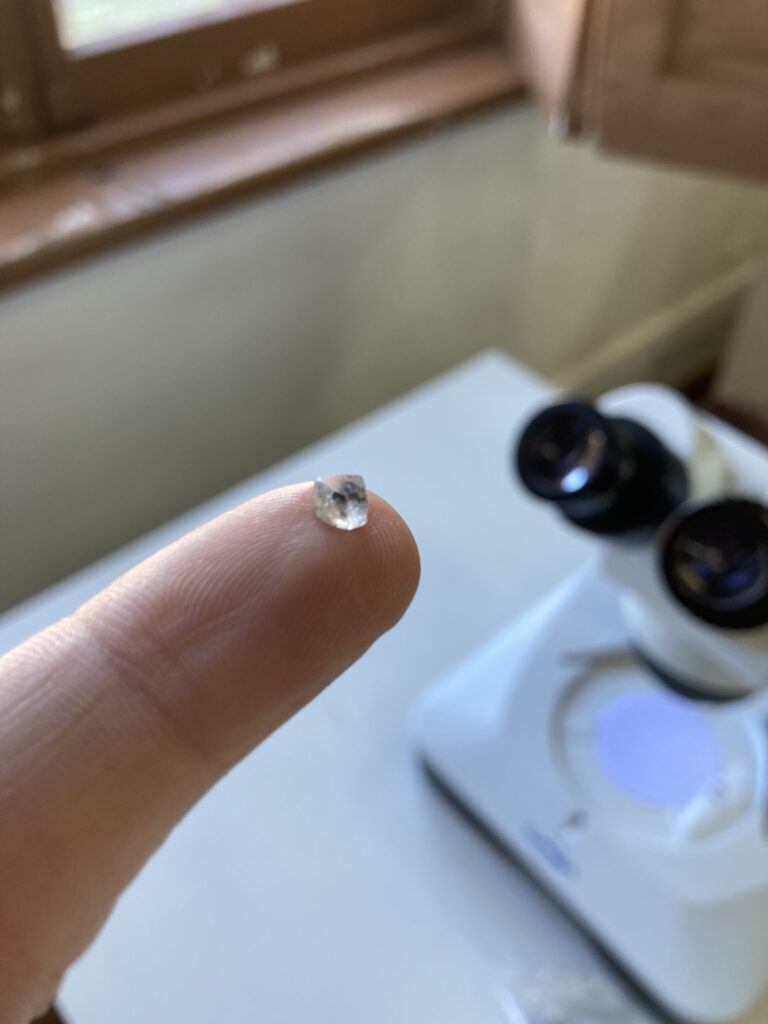
24. How would you explain your research area and topic to a child?
Imagine that you are traveling deep inside the Earth for 500 kilometers. This deep region of the Earth is formed by a variety of different minerals and diamonds. When these diamonds grow, they trap the surrounding minerals in their structure and instantaneously record the composition of this part of the Earth at the time they crystallized. After millions of years, diamonds and their mineral inclusions are brought to the surface through volcanic activity. Geoscientists can then collect these diamonds in the field and investigate the trapped mineral inclusions. These mineral inclusions may record, in terms of composition and structure, geological processes that occurred on the planet. Thus, geoscientists can translate this information into a better understanding of the Earth and its evolution.
25. How did you imagine your future as a child? What profession did you want to pursue?
When I was a child, I thought of being a skating teacher and a veterinary. I never thought I would become a geologist.
26. How do you keep your head clear when you are stressed?
I like to go for walks and to cook something nice for me and my family.
27. If you were the research minister of Germany, what would you do to improve the situation of women in science?
I would create funding programs only for women in their different stages of scientific life. My programs would have a grant especially for women that become a mother and need some bust in their research after the maternity leave.
28. What worries you most about the world? And what makes you most happy about the world?
The innumerous possibilities that we have, to do what we want. And nature! Nature for me is perfect, from the forest to the ocean, from mountains to the beach, from volcanoes to earthquakes. It’s amazing how we can have nature everywhere and enjoy it during our lives.
What scares me is how the population treats our planet and nature. It scares me when one says that they don’t believe in climate change, for instance.
29. If you could travel in time: in which epoch and at which discovery or event would you have liked to have been there?
I would like to travel back to the period of 1900-1930 more or less, and be in Europe to meet scientists like Marie Curie, Goldschmidt, Einstein and many other important scientists at that time. It would be amazing to travel back in time and be present at a conference where they would present their studies.
30. Which of your traits bothers you the most in your daily work? And which of your traits helps you the most?
When I am too excited about something or about an achievement I can’t concentrate.
What I find helpful is that I am very organized. Usually, even in a rush, due to my organization since the very beginning, I can finish things easily.
31. What is your favorite place to relax from research?
I like to go to small cities at the coast, and be close to the ocean. I try to do that once per year.
32. What surprised you most about the University of Münster? And what are the advantages and disadvantages of doing a remote-WiRe-fellowship?
I was pleasantly surprised at how they are prepared to receive researchers and help them with everything needed to be well and fast established in Münster.
Now, with a child at home, it is a huge advantage to be able to do my research in my home country. The disadvantage is to lose all the exchange I would have with other researchers if I were in Münster for all the fellowship time.
33. What is the biggest difference between the academic system you have last done research in and the academic system as you experience it in Münster / Germany? If you could change one thing about the academic system in which you have last done research in, what would it be?
The biggest difference is the support you have at the academic system in Germany, like the University of Münster, compared to the one we have in most universities in Brazil. The life as a scientist in Brazil requires a lot of effort since you also must do all the administration work, many hours of lectures, and all of this with almost no financial support.
I think I would propose to create different positions inside the Brazilian academia: lecturer and researcher positions. Now, researchers have to give a lot of ours of lectures, which leave them almost without time to develop their projects and really do science.



